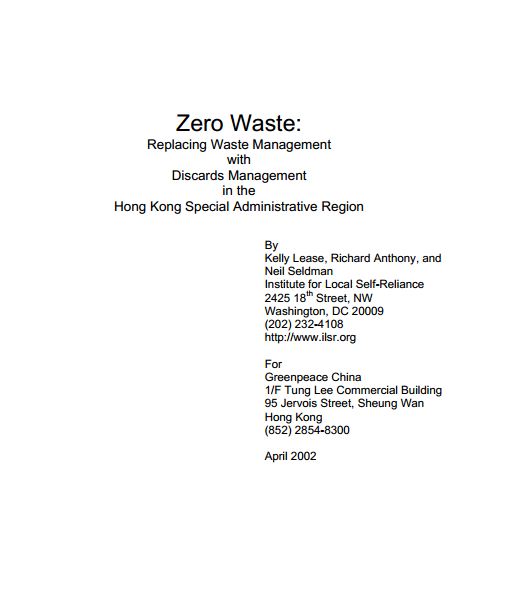Twenty-five years ago, many solid waste planners thought no more than 15% to 20% of the municipal waste stream could be recycled. Today numerous communities have surpassed 50% recycling, and many individual establishments — public and private sector — such as office buildings, schools, hospitals, restaurants, and supermarkets have approached 90% and higher levels. A handful of innovative communities in the U.S. and abroad have endorsed zero waste goals and planning. Del Norte, California, was the first U.S. community to adopt a zero waste management plan. Seattle’s current solid waste plan has adopted zero waste as a guiding principle. In 2002, the San Francisco Board of Supervisors adopted a 75% landfill diversion goal by the year 2010 and a long-term goal of zero waste. (San Francisco is already at 62% landfill diversion.) Other California communities are moving in this direction as well; Palo Alto, Berkeley, Oakland, San Diego. The zero waste movement is now international and growing exponentially, due in no small part to these “early adopters.”
ILSR provides technical assistance to communities interested in reducing the flow of materials to landfills and incinerators and embracing zero waste as a vision and planning tool for the future. This Zero Waste Planning Web page features innovative and model practices and policies that can be replicated in other communities.
Zero Waste Planning
COMMENTARY: Investing in Zero Waste … And Green Jobs (BioCycle Magazine, January 2009)
City of Austin’s Zero Waste Plan Earlier this year, by adopting the State’s first Zero Waste Plan for a Texas community, the City of Austin took an important step to move toward a more sustainable future.
Austin’s Zero Waste Plan takes into consideration Austin’s current and planned public and private solid waste infrastructure, as well as the city’s Climate Protection Program. Recommendations developed through this process are integral to achieve the U.N. Urban Environmental Accord’s goal to reduce by 20% the per capita solid waste disposal to landfills by 2012 and Zero Waste by 2040.
Replacing Waste Management with Discards Management in the Hong Kong Special Administrative Region By Kelly Lease, Richard Anthony, and Neil Seldman, © Institute for Local Self-Reliance, Washington, DC, April 2002. Download PDF file
Del Norte Zero Waste Plan by Del Norte Solid Waste Management Authority staff, Self-Reliance Inc. staff, and other consultants 2000, 170 pages$15 (incl. S&H)from the Del Norte Solid Waste Management Authority 391 Front Street, Crescent City, CA 95531(707) 465-1100, fax (707) 465-1300 e-mail: recycle@cc.northeast.com
This zero waste plan is the first of its kind in the U.S. It describes policies and strategies for reaching zero waste in Del Norte (CA). Other communities aiming for zero waste will find this plan essential reading.
Seattle Solid Waste Plan In 1998, the City of Seattle adopted a new solid waste plan, On the Path to Sustainability. The Plan adopted zero waste as a guiding principle and a goal to recycle 60% of all the waste generated in Seattle by 2008.
San Francisco’s Zero Waste Resolution Adopted by the San Francisco Commission on the Environment, April 16, 2002 This resolution urges the Mayor and Board of Supervisors of the City and County of San Francisco to adopt a goal of 75% landfill diversion by the year 2010 and to adopt a goal of zero waste by 2020. On September 30, 2002, the Board of Supervisors passed its own resolution adopting a 75% landfill diversion goal by the year 2010 and a long-term goal of zero waste, with the zero waste goal date to be set by the San Francisco Commission on the Environment once the state’s 50% diversion goal is met.
A Waste Management Strategy for Canberra: No Waste by 2010 Canberra, Australia, was the first large city to adopt a zero waste plan. Its plan aims to eliminate the city’s two landfills by 2010 and replace them with comprehensive “recycling estates.”
Zero Waste New Zealand This is the Web site of the Zero Waste New Zealand Trust. The Trust’s mission is to encourage and motivate all sectors of New Zealand society to work towards a target of zero waste.
GrassRoots Recycling Network Zero Waste Web Site This Web site includes many resources and links on zero waste.
See also: Defending Recycling – Moving Toward Zero Waste



